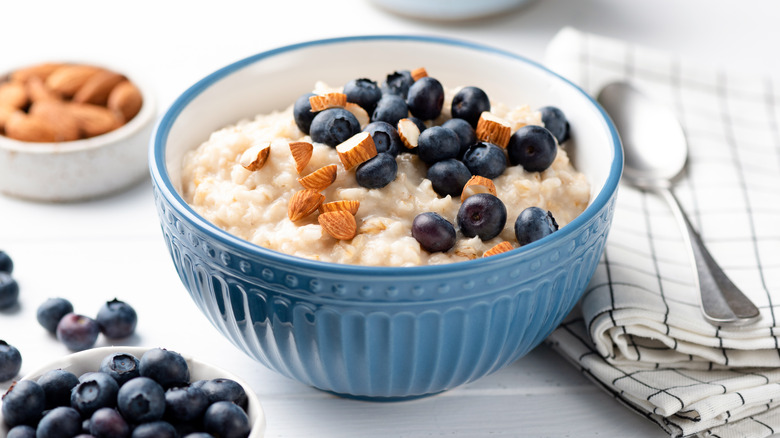The Downsides Of Eating Too Much Oatmeal
Commonly referred to as porridge and scientifically known as avena sativa, oatmeal — including rolled, steel-cut, or instant oats — is a great source of whole grains. Oats are packed full of antioxidants, fiber, vitamins, and minerals and are linked to several health benefits (via Healthline). For example, oatmeal can help aid digestion and relieve constipation. Oats are high in fiber, which plays an important role in the regulation of bowel movements. Eating oatmeal on a regular basis may make it easier for your stools to pass.
Oatmeal can also help lower LDL, or bad, cholesterol. Oats contain a soluble fiber called beta-glucan, which can reduce LDL cholesterol levels. Beta-glucan can also protect LDL cholesterol from oxidation and lower the risk of heart disease. In addition, oats and oatmeal contain powerful antioxidants like avenanthramides, which can reduce blood pressure by increasing the production of nitric oxide. This allows your blood vessels to dilate, creating better blood flow.
Although oatmeal is a healthy and nutritious breakfast food that can greatly benefit your overall health, eating too much may cause some unpleasant side effects. Yes, while it may not seem like it, there is such a thing as overeating oatmeal.
The side effects of too much oatmeal
According to health experts, eating too much oatmeal may lead to malnutrition (via Eat This, Not That). This is because oatmeal tends to keep you full longer, which may cause you to neglect other foods that are vital to a healthy and well-balanced diet. Since oatmeal can suppress your appetite and prevent you from eating other foods, it may also cause you to lose weight.
On the flip side, there's also a chance that eating an excessive amount of oatmeal will actually increase weight gain. However, this largely depends on the toppings you choose to add to your bowl of oatmeal. If you're adding a hefty amount of sugar and butter, eating this in excess may cause you to gain weight. Furthermore, eating too much oatmeal can cause gastrointestinal issues, like bloating. While oatmeal's high fiber content can help relieve constipation, it can also cause some people to experience gas and bloating. Eating smaller portions can help prevent this from happening.


